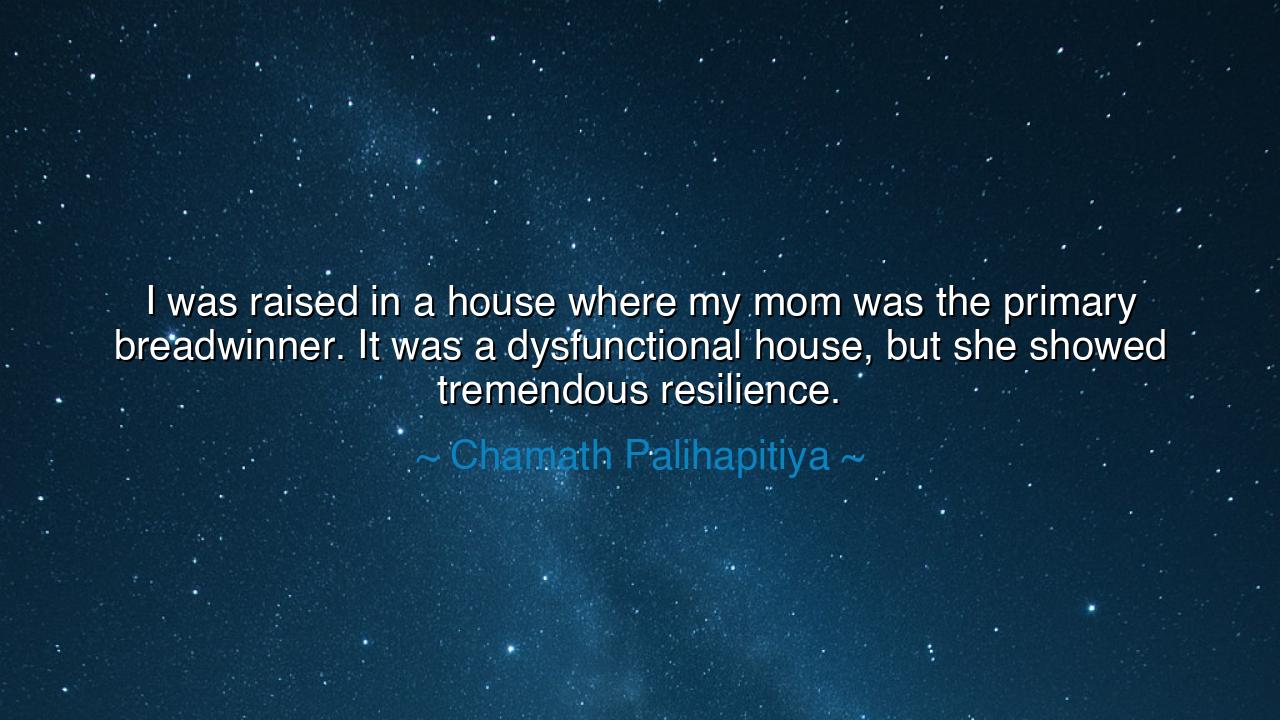
I was raised in a house where my mom was the primary breadwinner.
I was raised in a house where my mom was the primary breadwinner. It was a dysfunctional house, but she showed tremendous resilience.






The words of Chamath Palihapitiya, “I was raised in a house where my mom was the primary breadwinner. It was a dysfunctional house, but she showed tremendous resilience,” echo with the voice of a son who has seen hardship transformed into strength. They are not spoken in bitterness, but in reverence — for within them lives a truth that has endured through every age: that even amidst disorder, love and perseverance can become the foundation of greatness. This quote is not merely about the struggles of one family, but about the eternal power of resilience, and how the human spirit can rise from brokenness to build something luminous and whole.
Chamath speaks of a dysfunctional house — a phrase that carries both pain and honesty. It suggests a home where harmony was often overshadowed by conflict, where stability was fragile, and yet, where the will to survive remained unbroken. Many who have known such beginnings might see only despair in them, but Chamath’s reflection reminds us that even in the most imperfect environments, strength can be born. For his mother, burdened by responsibility, carrying the weight of both provider and nurturer, embodied the ancient virtue of fortitude — that quiet, tireless endurance that sustains life when all else falls away. In her example, he found not only survival, but the pattern of greatness: to face adversity not with surrender, but with persistence.
The ancients would have called his mother’s strength arete — excellence of spirit expressed through action. Like the women of old who kept the hearth burning when their men were gone to war, or like Penelope in Homer’s Odyssey, who wove and un-wove her tapestry each night in faith and patience, Chamath’s mother carried her household through time and turmoil with courage. She did not need perfection to inspire; she needed only endurance. And that endurance, seen through the eyes of a child, becomes a lifelong teacher — a reminder that the world does not reward comfort, but resilience. The soil of hardship, though bitter, grows the roots of greatness.
Consider, too, the story of Abraham Lincoln, who was raised in poverty, in a cabin without books, his mother dying when he was nine. The world around him was not kind, and yet from that humble and chaotic beginning emerged one of history’s greatest leaders. He once said, “All that I am, or hope to be, I owe to my angel mother.” Like Chamath, Lincoln saw in his mother’s endurance the light of a higher truth — that one need not be surrounded by order to create purpose. It is not the perfection of the home, but the strength of the heart within it, that shapes a life of meaning.
When Chamath calls his mother resilient, he honors not only her labor, but her refusal to break. To be the primary breadwinner in a home of struggle is to bear the double weight of provision and sacrifice. It is to wake when others sleep, to endure when others waver, to hold the structure of life together with invisible hands. Her resilience was not loud or glamorous — it was quiet, steady, sacred. From such endurance, the son learned his own path of perseverance — to rise above difficulty, to confront chaos not with despair but with ingenuity. For every leader, every innovator, every soul who seeks to create, first learns the discipline of endurance from those who carried them through life’s storms.
There is a deeper wisdom here: that even dysfunction can be a forge for greatness when met with courage. Many fear brokenness, believing it to destroy potential. Yet the ancients taught that the soul is tempered like steel — it must pass through fire to gain strength. The challenges of Chamath’s childhood did not curse him; they carved him. His mother’s labor was the anvil upon which his resilience was shaped. Through her, he learned that meaning is not inherited from comfort, but created through perseverance. And thus, from a home of struggle emerged a man of vision — one who understood both fragility and fortitude, and who could lead not from privilege, but from empathy.
The lesson, dear listener, is both timeless and profound: adversity does not define you — your response to it does. If your life feels disordered, if your beginnings were imperfect, take heart. You, too, are being shaped in the forge of resilience. Honor those who endured before you — the mothers, fathers, and elders who held their worlds together through sheer will. Let their strength become your inheritance, not their pain. And when you face the storms of your own life, remember what Chamath’s mother taught without words: that to persist is to prevail, and that from even the most broken beginnings can rise a legacy of greatness.
So, hold fast to this truth: resilience is nobility in motion. It needs no throne, no title, no applause. It is born in the silence of struggle, in the labor of love, in the quiet heroism of those who do what must be done. As Chamath’s words remind us, greatness often begins in the simplest of places — a small house, imperfect but alive with the will to endure. And from such homes, shaped by resilience, the future is born.






AAdministratorAdministrator
Welcome, honored guests. Please leave a comment, we will respond soon